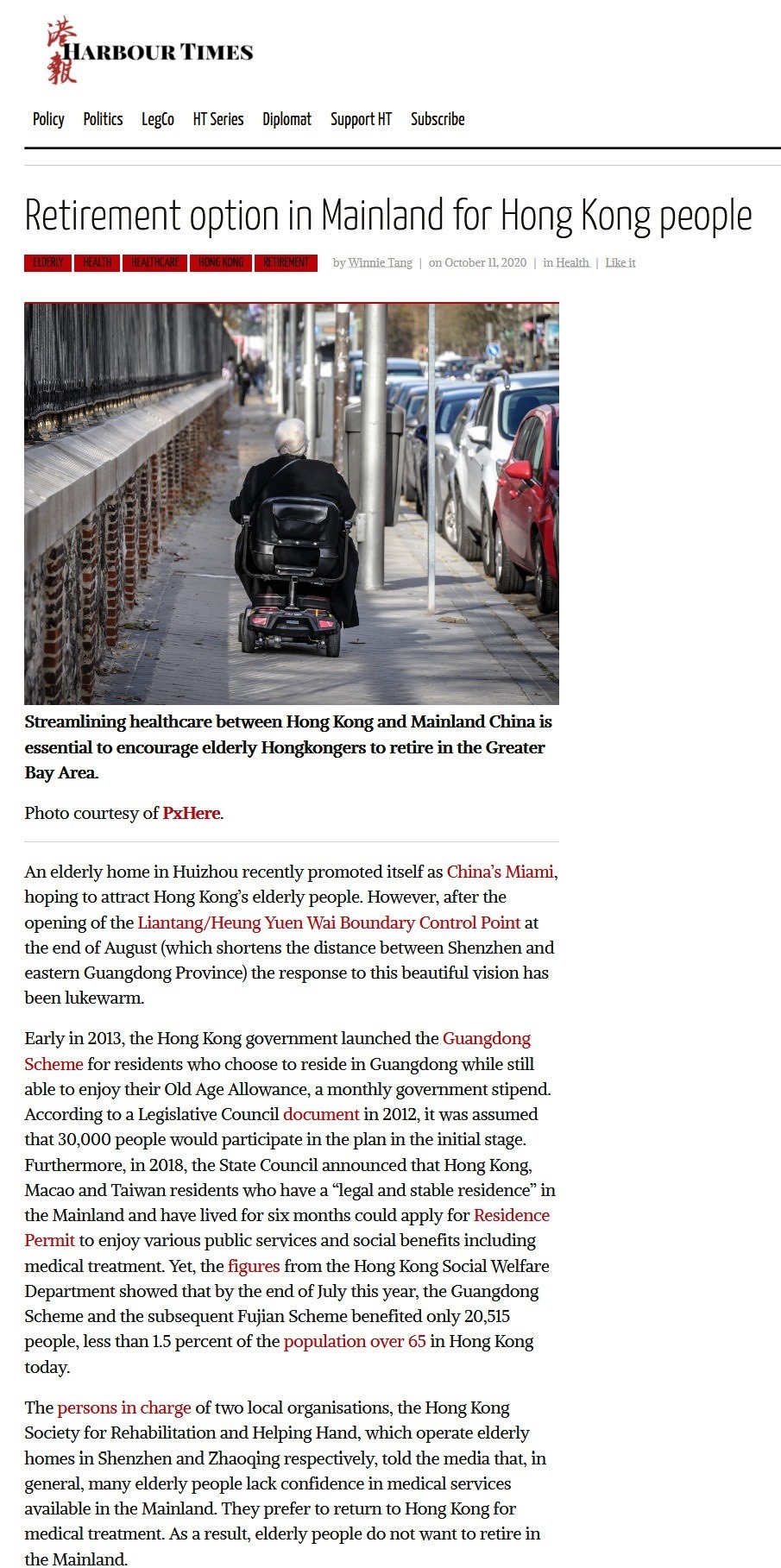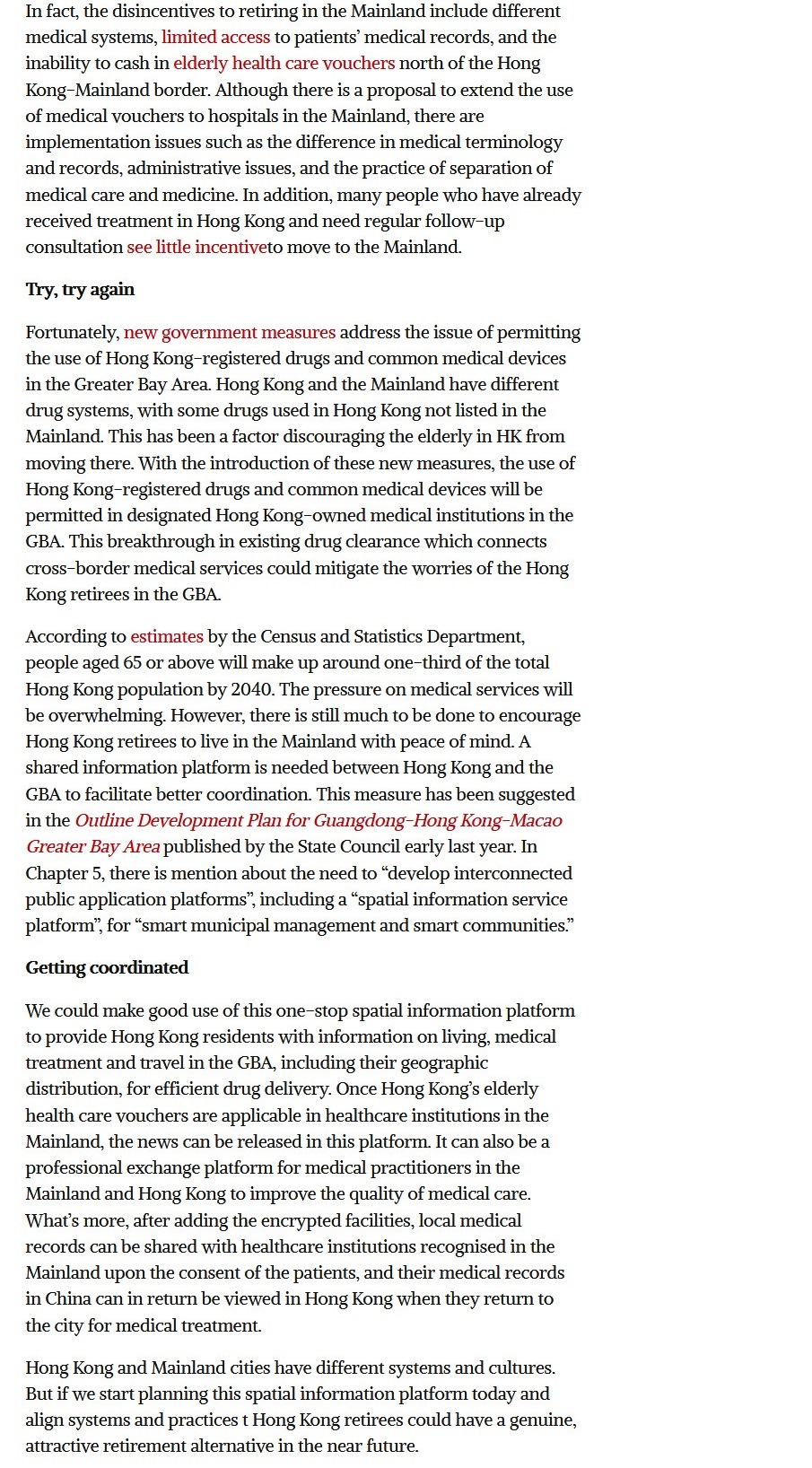網上版請按此


Retirement option in Mainland for Hong Kong people
An elderly home in Huizhou recently promoted itself as China's Miami, hoping to attract Hong Kong's elderly people. However, after the opening of the Liantang/Heung Yuen Wai Boundary Control Point at the end of August (which shortens the distance between Shenzhen and eastern Guangdong Province) the response to this beautiful vision has been lukewarm.
Early in 2013, the Hong Kong government launched the Guangdong Scheme for residents who choose to reside in Guangdong while still able to enjoy their Old Age Allowance, a monthly government stipend. According to a Legislative Council document in 2012, it was assumed that 30,000 people would participate in the plan in the initial stage. Furthermore, in 2018, the State Council announced that Hong Kong, Macao and Taiwan residents who have a "legal and stable residence" in the Mainland and have lived for six months could apply for Residence Permit to enjoy various public services and social benefits including medical treatment. Yet, the figures from the Hong Kong Social Welfare Department showed that by the end of July this year, the Guangdong Scheme and the subsequent Fujian Scheme benefited only 20,515 people, less than 1.5 percent of the population over 65 in Hong Kong today.
The persons in charge of two local organisations, the Hong Kong Society for Rehabilitation and Helping Hand, which operate elderly homes in Shenzhen and Zhaoqing respectively, told the media that, in general, many elderly people lack confidence in medical services available in the Mainland. They prefer to return to Hong Kong for medical treatment. As a result, elderly people do not want to retire in the Mainland.
In fact, the disincentives to retiring in the Mainland include different medical systems, limited access to patients' medical records, and the inability to cash in elderly health care vouchers north of the Hong Kong-Mainland border. Although there is a proposal to extend the use of medical vouchers to hospitals in the Mainland, there are implementation issues such as the difference in medical terminology and records, administrative issues, and the practice of separation of medical care and medicine. In addition, many people who have already received treatment in Hong Kong and need regular follow-up consultation see little incentiveto move to the Mainland.
Try, try again
Fortunately, new government measures address the issue of permitting the use of Hong Kong-registered drugs and common medical devices in the Greater Bay Area. Hong Kong and the Mainland have different drug systems, with some drugs used in Hong Kong not listed in the Mainland. This has been a factor discouraging the elderly in HK from moving there. With the introduction of these new measures, the use of Hong Kong-registered drugs and common medical devices will be permitted in designated Hong Kong-owned medical institutions in the GBA. This breakthrough in existing drug clearance which connects cross-border medical services could mitigate the worries of the Hong Kong retirees in the GBA.
According to estimates by the Census and Statistics Department, people aged 65 or above will make up around one-third of the total Hong Kong population by 2040. The pressure on medical services will be overwhelming. However, there is still much to be done to encourage Hong Kong retirees to live in the Mainland with peace of mind. A shared information platform is needed between Hong Kong and the GBA to facilitate better coordination. This measure has been suggested in the Outline Development Plan for Guangdong-Hong Kong-Macao Greater Bay Area published by the State Council early last year. In Chapter 5, there is mention about the need to "develop interconnected public application platforms", including a "spatial information service platform", for "smart municipal management and smart communities."
Getting coordinated
We could make good use of this one-stop spatial information platform to provide Hong Kong residents with information on living, medical treatment and travel in the GBA, including their geographic distribution, for efficient drug delivery. Once Hong Kong's elderly health care vouchers are applicable in healthcare institutions in the Mainland, the news can be released in this platform. It can also be a professional exchange platform for medical practitioners in the Mainland and Hong Kong to improve the quality of medical care. What's more, after adding the encrypted facilities, local medical records can be shared with healthcare institutions recognised in the Mainland upon the consent of the patients, and their medical records in China can in return be viewed in Hong Kong when they return to the city for medical treatment.
Hong Kong and Mainland cities have different systems and cultures. But if we start planning this spatial information platform today and align systems and practices t Hong Kong retirees could have a genuine, attractive retirement alternative in the near future.
Dr. Winnie Tang
Adjunct Professor, Department of Geography, Faculty of Social Sciences and Faculty of Architecture, The University of Hong Kong